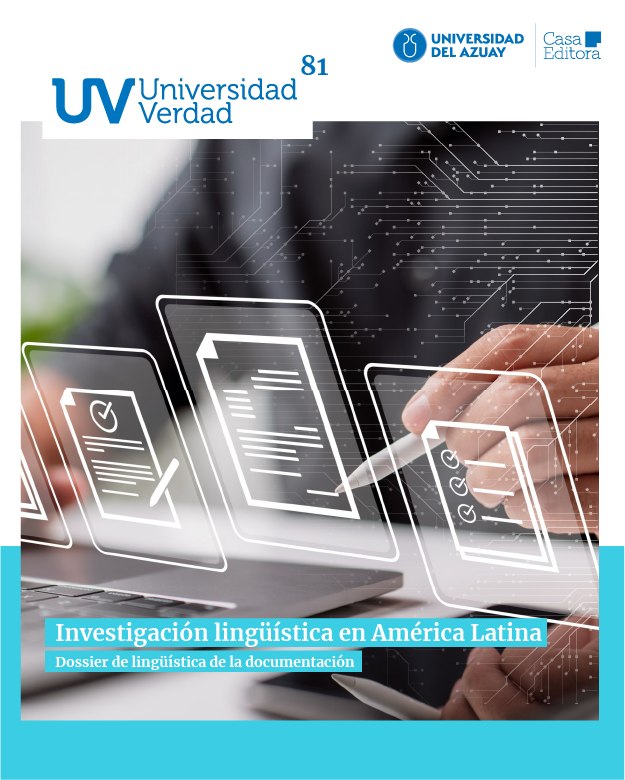REVITALIZACIÓN LINGÜÍSTICO-CULTURAL EN CONTEXTO. EL ROL DE LA ETNOBOTÁNICA Y LA INVESTIGACIÓN TRANSDISCIPLINARIA CON COMUNIDADES DE BASE
DOI:
https://doi.org/10.33324/uv.v2i81.563Palabras clave:
Ecuador, plantas medicinales, investigación interdisciplinaria contextualizada, conocimientos ancestrales, documentación activa-revitalizaciónResumen
En los últimos años, varios estudios nos han alarmado sobre la pérdida de miles de lenguas indígenas en el mundo, y lo que esto implica en el mantenimiento de la sabiduría ancestral. Así estudios etnobotánicos desarrollados en más de 200 comunidades alrededor del mundo, afirman que, con la pérdida de las lenguas, los conocimientos medicinales indígenas se extinguen sin dejar rastro, por lo que gran parte del valor terapéutico de las plantas y procedimientos en salud desaparecerá2. El hecho es que la pérdida
de las lenguas está fuertemente ligada a la extinción no solo del sistema lingüístico, sino también de concepciones y prácticas culturales relacionadas con la salud, la enfermedad, el uso de plantas medicinales y el ecosistema. Si se cumplen las predicciones de
UNESCO (2010) en el sentido de que para el próximo siglo desaparecían alrededor de 3.000 lenguas, esto implicaría que con ellas se reducirían drásticamente muchas especies útiles limitando el potencial de las contribuciones de la naturaleza a los humanos y
viceversa.
En relación con lo mencionado, este artículo describe un estudio desarrollado entre tres comunidades rurales hispanohablantes que habitan a solo 40 kilómetros de la capital de Ecuador, Quito, y el programa de investigación interdisciplinaria Oralidad Modernidad,
con el fin de documentar, recuperar y reforzar los conocimientos ancestrales relacionados con el uso de plantas medicinales, sus prescripciones, proscripciones, y el bienestar de los hablantes.
A lo largo del proceso, se evidencia cómo estudios de esta índole, desarrollados con una metodología basada en el diálogo igualitario y la ética de la investigación, contribuyen no solo a la ciencia, sino, y, sobre todo, a (re)aprender y (re)valorizar las lenguas indígenas como parte integral de ecologías complejas que incluyen los recursos naturales y, para el tema que nos atañe, las plantas medicinales y las estrategias curativas que son parte de la sabiduría ancestral, de los valores culturales, de la cosmovisión y del ecosistema.
Palabras clave: Ecuador, plantas medicinales, investigación interdisciplinaria contextualizada, conocimientos ancestrales, documentación activa-revitalización
Abstract
In recent years, several studies have raised the alarm about the loss of thousands of indigenous languages in the world and what this implies in maintaining ancestral wisdom. Cámara-Leret and Bascompte (2021) based on ethnobotanical studies in more than 200 communities around the world, state that with the loss of languages, indigenous medicinal knowledge will disappear leaving no trace, and therefore, much of the plants therapeutic value will pass away. The fact is that language displacement is strongly tied to the loss of linguistic and cultural knowledge about health, medicinal plants and the ecosystem. Furthermore, it is most likely to think that the extinction of language and the reduction of useful species may limit the full potential of the nature’s contributions to humans and vice-versa.
In regard to the aforementioned situations, this article describes an ongoing study carried out between three Spanish-speaking rural communities located just 40 kilometers away from the capital of Ecuador, Quito, and the interdisciplinary research program Oralidad Modernidad, with the goal of documenting, recovering and reinforcing the ancestral knowledge related to the use of medicinal plants, their prescriptions, proscriptions, and the speakers’ well-being. Throughout the process, it becomes evident how studies developed with a methodology based on egalitarian dialogues and research ethics, contribute not only to science, but most importantly to relearn
and revalue indigenous languages as an integral part of complex ecologies that encompass natural resources, medicinal plants and healing strategies which are part of the speakers’ ancestral wisdom, cultural values, and worldview.
This sort of studies not only motivates us to move towards the recovery of languages and cultures in danger, but drives us towards rethinking the role played by academics, and the urgency to develop appropriate theories and methodologies that could better account for complexity from holistic perspectives.
Keywords: Ecuador, medicinal plants, interdisciplinary contextualized research, ancestral knowledge, active documentation-
revitalization.





